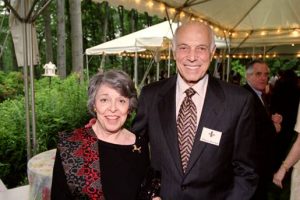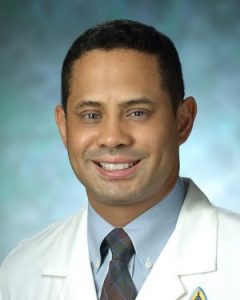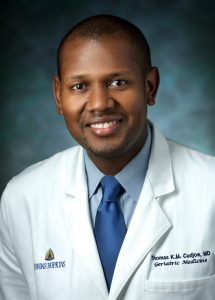 ROBERT E. MEYERHOFF was born and raised in Baltimore and received a Bachelor of Science in civil engineering from the Massachusetts Institute of Technology in 1944. He served as an officer in the United States Navy Civil Engineers Corps and participated in the invasion of Okinawa with the 28th Construction Battalion – “Seabees.” He was married to JANE MEYERHOFF who died in 2004. They raised a family, including a daughter, Rose Ellen Meyerhoff Greene, and twin sons, Neil Meyerhoff and John Meyerhoff, M.D.
ROBERT E. MEYERHOFF was born and raised in Baltimore and received a Bachelor of Science in civil engineering from the Massachusetts Institute of Technology in 1944. He served as an officer in the United States Navy Civil Engineers Corps and participated in the invasion of Okinawa with the 28th Construction Battalion – “Seabees.” He was married to JANE MEYERHOFF who died in 2004. They raised a family, including a daughter, Rose Ellen Meyerhoff Greene, and twin sons, Neil Meyerhoff and John Meyerhoff, M.D.
Professionally, Mr. Meyerhoff has been active in housing and apartment development in Baltimore. He is also a prominent art collector and has successfully bred horses.
Mr. Meyerhoff has been devoted to increasing the participation of promising and outstanding diverse students and scholars in the sciences for many decades. The Meyerhoff Scholars Program at University of Maryland, Baltimore County (UMBC), established in 1988, serves as a national model for expanding minority participation in the sciences. At Johns Hopkins, where Mr. Meyerhoff has been a generous donor for over 40 years, he has continued his support of this cause by funding the Robert E. Meyerhoff Professorships and now the Robert and Jane Meyerhoff Professorships at the Johns Hopkins School of Medicine. Additionally, Mr. Meyerhoff has supported the Johns Hopkins Peabody Institute’s Diversity Initiative as well as the late Leon Fleisher’s piano studio.
Mr. Meyerhoff shares his passion for the arts with his partner, Mrs. Rheda Becker, who is both a former faculty member and avid supporter of the Peabody Conservatory. She is recognized as one of the outstanding professionals in the specialized art of musical narration. Mrs. Becker has performed with a variety of renowned orchestras across the country. In 2014, she and Mr. Meyerhoff were appointed Lifetime Directors of the Baltimore Symphony Orchestra where Mrs. Becker has been a musical narrator for over four decades.
Held by Shaun Michael Kunisaki
 SHAUN MICHAEL KUNISAKI, M.D., M.Sc., F.A.A.P., F.A.C.S., was recruited from the University of Michigan Medical School at the rank of Associate Professor to the Division of Pediatric Surgery at the Johns Hopkins University. A graduate of Harvard University (undergraduate and medical degrees, with honors) and the London School of Economics & Political Science, London School of Hygiene & Tropical Medicine (masters of science), Dr. Kunisaki’s clinical practice spans the full breadth of pediatric general surgery, but he is recognized both regionally and nationally for this expertise in surgical problems of the lungs and esophagus in the fetus and young child. As Director of Pediatric Esophageal Center at Johns Hopkins, he specializes in the management of long-gap esophageal atresia. In his role within the Johns Hopkins Children Center Fetal Program, he helps counsel parents with pregnancies complicated by fetal anomalies. His basic science and translational research laboratory is funded by the National Institutes of Health and is largely focused on using novel scaffolds and stem cells derived from a patient’s own tissues to better understand and treat several important pediatric surgical diseases.
SHAUN MICHAEL KUNISAKI, M.D., M.Sc., F.A.A.P., F.A.C.S., was recruited from the University of Michigan Medical School at the rank of Associate Professor to the Division of Pediatric Surgery at the Johns Hopkins University. A graduate of Harvard University (undergraduate and medical degrees, with honors) and the London School of Economics & Political Science, London School of Hygiene & Tropical Medicine (masters of science), Dr. Kunisaki’s clinical practice spans the full breadth of pediatric general surgery, but he is recognized both regionally and nationally for this expertise in surgical problems of the lungs and esophagus in the fetus and young child. As Director of Pediatric Esophageal Center at Johns Hopkins, he specializes in the management of long-gap esophageal atresia. In his role within the Johns Hopkins Children Center Fetal Program, he helps counsel parents with pregnancies complicated by fetal anomalies. His basic science and translational research laboratory is funded by the National Institutes of Health and is largely focused on using novel scaffolds and stem cells derived from a patient’s own tissues to better understand and treat several important pediatric surgical diseases.
Held by Thomas K.M. Cudjoe
 THOMAS K.M. CUDJOE, M.D., M.P.H., is an Assistant Professor in the Division of Geriatric Medicine and Gerontology. He received his undergraduate degree with honors at Hampton University and was active in the Honors College and Army ROTC program. He earned his medical degree from Robert Wood Johnson Medical School and a master’s degree in public health in health policy at Harvard School of Public Health. His training continued in Internal Medicine at Howard University, with a clinical and research fellowship in the Division of Geriatric Medicine and Gerontology at the Johns Hopkins University School of Medicine. In addition, he is a Major in the United States Army Reserves Medical Corps.
THOMAS K.M. CUDJOE, M.D., M.P.H., is an Assistant Professor in the Division of Geriatric Medicine and Gerontology. He received his undergraduate degree with honors at Hampton University and was active in the Honors College and Army ROTC program. He earned his medical degree from Robert Wood Johnson Medical School and a master’s degree in public health in health policy at Harvard School of Public Health. His training continued in Internal Medicine at Howard University, with a clinical and research fellowship in the Division of Geriatric Medicine and Gerontology at the Johns Hopkins University School of Medicine. In addition, he is a Major in the United States Army Reserves Medical Corps.
Dr. Cudjoe is focused on understanding how social factors influence the health of older adults and developing strategies to improve the health trajectory of older adults. His research has focused on identifying risk factors for social isolation and currently examines the relationship between social connectedness and health outcomes.
 ROBERT E. MEYERHOFF was born and raised in Baltimore and received a Bachelor of Science in civil engineering from the Massachusetts Institute of Technology in 1944. He served as an officer in the United States Navy Civil Engineers Corps and participated in the invasion of Okinawa with the 28th Construction Battalion – “Seabees.” He was married to JANE MEYERHOFF who died in 2004. They raised a family, including a daughter, Rose Ellen Meyerhoff Greene, and twin sons, Neil Meyerhoff and John Meyerhoff, M.D.
ROBERT E. MEYERHOFF was born and raised in Baltimore and received a Bachelor of Science in civil engineering from the Massachusetts Institute of Technology in 1944. He served as an officer in the United States Navy Civil Engineers Corps and participated in the invasion of Okinawa with the 28th Construction Battalion – “Seabees.” He was married to JANE MEYERHOFF who died in 2004. They raised a family, including a daughter, Rose Ellen Meyerhoff Greene, and twin sons, Neil Meyerhoff and John Meyerhoff, M.D.
